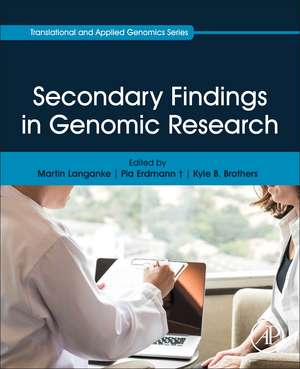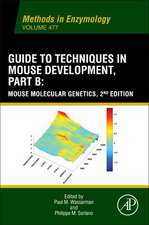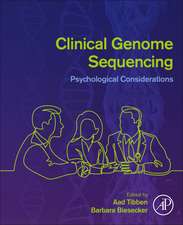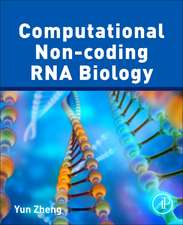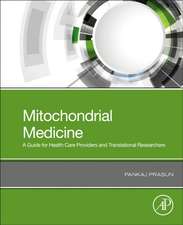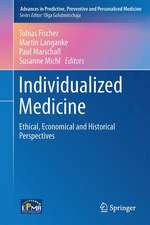Secondary Findings in Genomic Research: Translational and Applied Genomics
Martin Langanke, Pia Erdmann, Kyle B. Brothersen Limba Engleză Paperback – 3 mar 2020
Contributors from Europe, North America, and Asia effectively synthesize perspectives from a spectrum of different scientific, societal, and global contexts, and offer pragmatic approaches to a range of topics, including oversight, governance and policy surrounding secondary genomic results, criteria for identifying results for return, communication and consent, stakeholders’ attitudes and perspectives, disclosing results, and clinical, patient-centered protocols.
- Thoroughly addresses the scientific, ethical, practical and clinical issues raised by secondary findings resulting from genomic research, including active debate and challenges in the field
- Provides researchers, clinicians, regulators, and stakeholders with a holistic, interdisciplinary approach to interpreting, managing and disclosing secondary findings
- Brings together expert analysis from scholars across Europe, North America, and Asia representing a wide variety of scientific and societal contexts
Preț: 795.21 lei
Preț vechi: 873.85 lei
-9% Nou
Puncte Express: 1193
Preț estimativ în valută:
152.17€ • 160.01$ • 125.73£
152.17€ • 160.01$ • 125.73£
Carte tipărită la comandă
Livrare economică 10-24 aprilie
Preluare comenzi: 021 569.72.76
Specificații
ISBN-13: 9780128165492
ISBN-10: 0128165499
Pagini: 244
Ilustrații: 40 illustrations (10 in full color)
Dimensiuni: 191 x 235 mm
Editura: ELSEVIER SCIENCE
Seria Translational and Applied Genomics
ISBN-10: 0128165499
Pagini: 244
Ilustrații: 40 illustrations (10 in full color)
Dimensiuni: 191 x 235 mm
Editura: ELSEVIER SCIENCE
Seria Translational and Applied Genomics
Public țintă
Active researchers, basic and translational scientists, clinicians, postgraduates, and students in the areas of genetics, human genomics, pathology and bioinformatics; medical students, pediatricians; internal medicine physicians and residents; genetic counselors, and genetic counseling students; clinical and laboratory genetics trainees (residents and fellows); law students and legal professionals; students and professional in biomedical ethics, research ethics, public policy, and regulatory practiceCuprins
1. Concept, history, and state of debate
2. Oversight, governance, and policy for making decisions about return of individual genomic findings
3. Selecting secondary findings to report: Creating a list that suits your study
4. How secondary findings are made
5. Informed consent and decision-making
6. Reporting of secondary findings in genomic research: Stakeholders’ attitudes and preferences
7. Disclosing genomic sequencing results
8. Implications of secondary findings for clinical contexts
9. Secondary findings: Building a bridge to the future of ELSI
2. Oversight, governance, and policy for making decisions about return of individual genomic findings
3. Selecting secondary findings to report: Creating a list that suits your study
4. How secondary findings are made
5. Informed consent and decision-making
6. Reporting of secondary findings in genomic research: Stakeholders’ attitudes and preferences
7. Disclosing genomic sequencing results
8. Implications of secondary findings for clinical contexts
9. Secondary findings: Building a bridge to the future of ELSI
